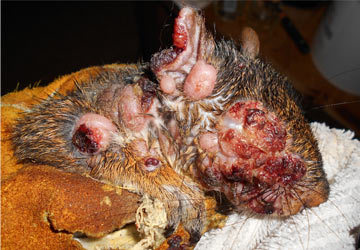Description
Squirrel pox, also known as squirrel fibromatosis, is a disease caused by the Lepripox virus. Lepripox produces epidermal fibromas, or tumors, in red, gray, and fox squirrels. It is closely related to the group of viruses that cause tumors in wild rabbits and deer. Squirrel pox is found throughout multiple Eastern and Midwestern states, including northern Indiana and the lower peninsula of Michigan. In Indiana, squirrel pox has been found in red, gray, and fox squirrels.
Transmission
The tumors are likely caused by the Lepripox virus, which is transmitted through the bite of mosquitoes, fleas, and contact with infected individuals or contaminated objects. There may be increased transmission among individuals where feeders bring large groups in close contact with each other. Squirrel fibromatosis does not infect humans or common house pets such as dogs and cats; however, it may be transmitted to woodchucks in the wild and to rabbits in a laboratory setting.
Clinical Signs
Juvenile squirrels are most affected by the onset of the virus. The tumors present themselves throughout the animal's body, ranging in size up to 25mm in diameter. The tumors typically do not affect the animal nor its ability to survive. In rare cases, the tumors spread to the internal organs, negatively impacting the animal's overall health. In severe cases, the tumors can cause the animal to become weak and lethargic.
Wildlife Management Implications
Populations of red, gray, and fox squirrels only see a few documented cases each year. Squirrel pox typically does not cause many deaths. The animals often recover naturally without significant impacts to the population.
Human Health Significance
There have been no reports of infected humans, including from consumption, if the tumors do not reach internal organs. If internal tumors are found, do not consume the animal and discard the carcass properly. If you come into contact with a sick animal, remember to wear gloves and other personal protective equipment. You can find additional information on fibromas and squirrel poxvirus at Cornell Wildlife Health Lab.

Lesions spread on the side of the face of an Eastern fox squirrel.
Photo courtesy of Aimee at FourWands Wildlife.
